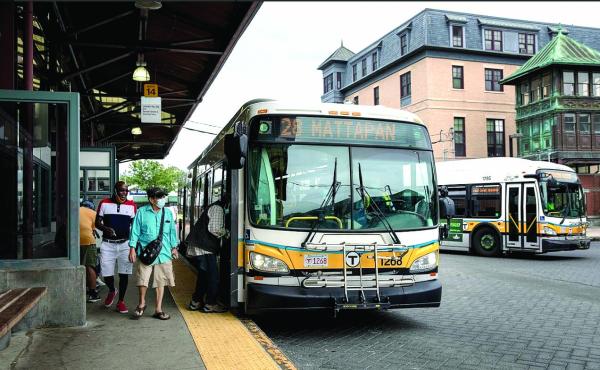November 23, 2021

A 28 bus to Mattapan picks up passengers at the Nubian Square bus station. Robin Lubbock/WBUR photo
The MBTA’s environmental push to switch out its diesel buses for vehicles powered by electrification is underway.
While the project’s goal is greener and more efficient transportation, TransitMatters, a group that advocates for equitable public transit in Boston, is arguing that the agency’s plan in North Cambridge to replace the area’s trolley buses is a waste of resources that further delays renovations that could be made to reduce transit emissions in other communities, including Dorchester and Mattapan.
In North Cambridge, electric trolleybuses and their overhead power lines would be replaced with battery-driven electric buses. The T wants to replace the old system because roadwork, wire problems, and other incidents often keep the trolleybuses off the road, which means diesel buses operating in their place, according to a spokesman for the public transit agency.
But Jarred Johnson, the executive director of TransitMatters, said that the new electric buses would require diesel heaters in the winter that in turn create carbon emissions.
“Replacing already electric buses with electric buses that also probably have to use diesel—that’s just not what you do when you’re serious about climate change,” Johnson said.
For the MBTA, a transition to a greener bus system as quickly as possible will be done by replacing the North Cambridge trolley system with a hybrid electric and diesel heating system, agency spokesperson Joe Pesaturo said, adding: “These buses will primarily use electric heating, supplemented with diesel heating on the coldest days to limit emissions to the maximum extent possible.”
Diesel heaters are necessary, the T says, because the electric buses would struggle to keep riders and drivers warm during the winter.
“However, diesel interior heating is envisioned to be phased out as we learn from these large-scale deployments, make operational changes, and develop charging networks throughout the cities and towns,” the agency noted.
As to the MBTA’s plans to eventually eliminate its diesel heating systems, Johnson said he believes this interim step is a waste of time and resources and the reason for “time, money, and energy not being spent on Dorchester and Mattapan.”
The MBTA has cited plans to build an electric bus garage in Quincy by 2024. An electric bus garage is also set to be built in way, and a garage along the Arborway is expected to be constructed between 2024 and 2026.
Johnson said he believes the money the MBTA is allocating to the trolleybus project in North Cambridge should instead be used to accelerate progress on Jamaica Plain’s Arborway garage—where funding still hasn’t been secured, according to a report released by the MBTA in April. He also said the MBTA could purchase electric buses for the Quincy garage that would be planned for routes in Ashmont and Mattapan.
Johnson believes the MBTA’s plans are prioritizing communities that aren’t as heavily impacted by air pollution, including Dorchester and Mattapan, where rates of asthma and other respiratory illnesses are higher than neighborhoods like Cambridge.
“There are a number of reasons why the life expectancy is so much lower for neighborhoods in Dorchester, as compared to Back Bay and other neighborhoods, but certainly air quality and transportation [are among] those reasons,” he said.
The MBTA has said its plans will cost less and reduce emissions, but Johnson disagrees, saying that the agency’s plans in Cambridge with electric buses will actually backtrack on its promise to convert its bus system into clean transportation sources.
“I think equity is all or nothing,” he said, “infusing it into everything you do. I don’t think it’s something you get to pick and choose on. This is one case where the T is not leading with equity.”



